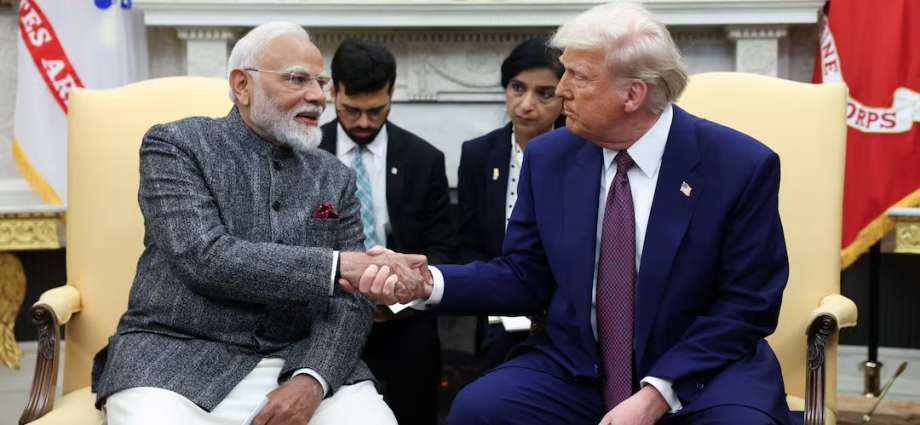Announcement of US Tariffs on Indian Products is Concerning
India’s Position on Illegal Immigrants Has Weakened
It is Shameful That Indian Citizens Were Deported in Handcuffs
Indian Analysts Pushp Ranjan and Vivek Shukla Speak to VOA
Washington ( Web News )
Indian Prime Minister Narendra Modi’s recent visit to the United States has become a topic of discussion in local media, with some calling it a successful trip. However, analysts believe that from a trade perspective, the visit was not very beneficial.
On Thursday, Prime Minister Modi held a joint press conference with US President Donald Trump at the White House following their meeting. Modi stated that the US, as a strategic and reliable partner, is playing a crucial role in India’s defense preparations. In the coming days, both countries will move rapidly toward joint arms manufacturing, co-production, and technology transfer.
The US and India have agreed to review arms transfer regulations, including the International Traffic in Arms Regulations (ITAR), to facilitate defense trade, technology transfer, and maintenance of US military equipment in India.

Regarding trade, President Trump had previously called India the “Tariff King,” claiming that India imposes the highest tariffs on US goods. According to senior analyst Pushp Ranjan, Modi’s visit to the US was a mixed experience of joy and sorrow. While India succeeded in securing concessions in the Tahawwur Rana case, the visit could not be considered a success in terms of trade.
Speaking to Voice of America, he said that Trump’s announcement of reciprocal foreign product taxes is worrying and will affect Indian trade. Following Trump’s announcement, India’s stock market experienced an immediate decline.
Ranjan explained that India imposes a 100% tax on American motorcycles, while the US charges only about 2.5% on Indian motorcycles. When Indian Finance Minister Nirmala Sitharaman presented the budget on February 1, some product taxes were reduced, which Ranjan believes was intended to appease the US. However, he warns that the future trajectory of US-India trade does not look favorable for India.
Experts predict that higher US tariffs on Indian products will lead to reduced demand and negatively impact suppliers.
Trump and Modi have agreed to increase bilateral trade to $500 billion by 2030, but analysts Vivek Shukla and Pushp Ranjan deem this goal unrealistic. Shukla believes that within five years, achieving this target is highly unlikely. He suggests that the leaders may have set this goal simply to please each other. Ranjan further argues that the US is mainly focused on reducing its trade deficit, and only time will tell how much progress is made.

Shukla also pointed out that the US aims to counter China’s Belt and Road Initiative. As a result, the US has agreed to participate in the India-Middle East-Europe Economic Corridor (IMEC). If successfully implemented, this initiative could prevent obstacles in US-India trade.
IMEC is a proposed economic corridor between India and Europe, passing through the Middle East. It was announced during the G20 summit in India in 2023. Experts believe that IMEC will enhance connectivity and economic development between the Gulf and Europe and is seen as a rival project to China’s Belt and Road Initiative.
Analysts highlight that India is a major defense market, and several countries are eager to supply it with energy and military equipment. Shukla noted that there is competition between the US and Russia over supplying fighter jets to India. Traditionally, India has purchased most of its weapons from Russia, but the US is pushing India to buy more defense equipment from American companies. The US also seeks to expand cooperation in the energy sector.
Shukla emphasized that Trump’s statement about increasing arms sales to India and paving the way for the supply of F-35 stealth fighter jets is significant.
Regarding Modi’s meeting with Elon Musk, Ranjan criticized that Modi himself requested the meeting, which is unbecoming of a head of state. He believes Musk is keen to enter the Indian market due to the growing demand for electric vehicles. However, Ranjan warns that India’s trade deals with the US could turn it into a colony of American businessmen.
During his meeting with President Trump, Modi used the slogan “Make India Great Again (MIGA),” inspired by Trump’s “Make America Great Again (MAGA)”. Ranjan dismissed this as mere imitation rather than serious diplomacy.
On the issue of illegal immigrants, analysts argue that India’s position has weakened. Ranjan highlighted that the US deported Indian illegal immigrants in military aircraft while they were handcuffed, which he described as shameful for India.
- Indian Foreign Minister S. Jaishankar addressed the Indian Parliament on this matter, stating that US deportation procedures follow their standard operating protocols (SOPs) and that India is willing to accept its illegal migrants.

